| Listing 1 - 10 of 37 | << page >> |
Sort by
|
Book
ISBN: 9781910589045 1910589047 9781910589052 1910589055 Year: 2017 Publisher: Swansea Classical Press of Wales
Abstract | Keywords | Export | Availability | Bookmark
 Loading...
Loading...Choose an application
- Reference Manager
- EndNote
- RefWorks (Direct export to RefWorks)
In recent decades, international research on Virgil has been marked, if not dominated, by the ideas of the 'Harvard School' and similar trends, according to which the poet was engaged in an elaborate work of subtle subversion, directed against the new ruler of the Roman world, Octavian-Augustus. Much of Virgil's oeuvre consists prima facie of eulogy of the ruler, and of emphatic prediction of his enduring success: this is explained by numerous modern critics as generic convention, or as studied ambiguity, or as irony. This paradoxical position, which runs against ancient-as well as much modern-interpretation of the poet, continues to create widespread unease. Stahl's new monograph is the most thorough study so far to question modern Virgilian criticism on philological grounds. He based himself on the internal logic and rhetoric of the Aeneid, and considers also political, historical, archaeological and philosophical subjects addressed by the poem. He finds that the poet has so presented the morality of his central figure, Augustus' supposed ancestor Aeneas, and of those who (eventually) clash with him, Turnus and Dido, as to make it certain that Roman readers and hearers of the poem were meant to conclude in Aeneas' favour. Virgil's intention emerges from Stahl's thorough, ingenious and original argumentation as decisively pro-Augustan. Stahl's work, in short, will not only enliven debate on current critical hypotheses but for many will enduringly affect their credibility.
Book
ISBN: 9782728309689 272830968X Year: 2014 Volume: 484 Publisher: Rome : Ecole française de Rome,
Abstract | Keywords | Export | Availability | Bookmark
 Loading...
Loading...Choose an application
- Reference Manager
- EndNote
- RefWorks (Direct export to RefWorks)
Janvier 27 avant notre ère : sur les décombres de la défunte République, Octavien/Auguste posait les fondations du Principat. À ses côtés, fidèle entre tous, Mécène, appelé à devenir l’archétype du patron littéraire. Depuis les guerres civiles, certains des poètes les plus en vue à Rome bénéficiaient de sa protection et de ses largesses. Il n’en fallut pas plus pour que le soupçon d’instrumentalisation naisse chez les Modernes. À rebours des théories classiques, l’auteur s’attache à démontrer que les poètes n’ont jamais eu à souffrir de ce compagnonnage. Non seulement le pouvoir naissant ne chercha pas à instrumentaliser leur talent afin d’asseoir le régime nouveau, mais ce sont bien plutôt les poètes qui prétendirent influencer ce dernier. Les liens entre la poésie et le politique dépassent toutefois la seule question de l’instrumentalisation. La période qui va de la fin de la République au début du Principat a été marquée par une vie littéraire florissante. Virgile, Horace, Properce, Tibulle, Ovide, d’autres encore, menèrent alors les lettres latines à leur apogée. Ils entendirent donner à la poésie latine la prééminence sur sa rivale grecque. Ils parachevaient là une dynamique apparue au tournant du milieu du Ier avant notre ère Chapeautés par leurs patroni, ils souhaitèrent associer Octavien/Auguste à ce mouvement. Loin d’avoir joué le rôle d’initiateur, le Princeps répondit à une attente pressante, sans éclipser pour autant le rôle des aristocrates dans le domaine littéraire. Au fil des pages, le livre dévoile les modalités de la vie littéraire à Rome dans un contexte politique singulier. Il met en cause l’existence des cercles littéraires tout en analysant l’intérêt des aristocrates comme Mécène, Messalla ou Pollion à protéger les poètes et les caractéristiques de ce patronage.
Political poetry, Latin --- Politics and literature --- Propaganda, Roman --- Poésie politique latine --- Politique et littérature --- Propagande romaine --- History and criticism --- Histoire et critique --- Rome --- History --- Histoire --- Latin poetry --- Political aspects --- Poésie politique latine --- Politique et littérature --- Histoire et critique. --- Latin poetry - Political aspects --- Politics and literature - Rome
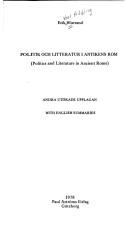
ISBN: 9185058823 9789185058822 Year: 1978 Volume: 7 Publisher: Göteborg: Åström,
Abstract | Keywords | Export | Availability | Bookmark
 Loading...
Loading...Choose an application
- Reference Manager
- EndNote
- RefWorks (Direct export to RefWorks)
Latin literature --- Politics in literature --- Littérature latine --- Politique dans la littérature --- History and criticism --- Histoire et critique --- Politics and literature --- -Politics and literature --- -Literature --- Literature and politics --- Literature --- Roman literature --- Classical literature --- Classical philology --- Latin philology --- Political aspects --- History and criticism. --- -History and criticism --- Littérature latine --- Politique dans la littérature --- Latin literature - History and criticism --- Politics and literature - Rome
Book
ISBN: 9789004274488 9004274480 1322128057 9004278737 9789004278738 Year: 2014 Volume: 371 Publisher: Leiden, Netherlands
Abstract | Keywords | Export | Availability | Bookmark
 Loading...
Loading...Choose an application
- Reference Manager
- EndNote
- RefWorks (Direct export to RefWorks)
"Cicero's dialogue Brutus offers a history of Roman eloquence from its origins and Greek roots up to the time of the work's composition (46 BC) in the late Republic. It forms part of Cicero's response to the political and intellectual changes brought about by Caesar's dictatorship and has therefore attracted considerable scholarly attention from a number of fields. However, scholarly discourse has frequently remained isolated. This volume addresses the need to look at Cicero's treatise from an interdisciplinary angle and assembles contributions from scholars of historiography, prosopography, rhetoric, philosophy and politics. It thus puts forward a coherent and genuine interpretation of Cicero's Brutus that showcases the significance of this text for our understanding of the final years of the Roman Republic"--Provided by publisher.
Oratory, Ancient --- Rhetoric, Ancient --- Politics and literature --- Cicero, Marcus Tullius. --- Oratory, Ancient. --- Rhetoric, Ancient. --- Eloquence antique --- Rhétorique ancienne --- Politique et littérature --- Ancient rhetoric --- Classical languages --- Greek language --- Greek rhetoric --- Latin language --- Latin rhetoric --- Rhetoric --- Politics and literature - Rome --- Cicero, Marcus Tullius. - Brutus
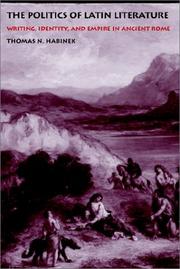
ISBN: 0691089841 0691068275 1400822513 128275338X 9786612753381 1400811929 9781400811922 9781400822515 9780691068275 6612753382 9781282753389 9780691089843 Year: 2001 Publisher: Princeton, NJ
Abstract | Keywords | Export | Availability | Bookmark
 Loading...
Loading...Choose an application
- Reference Manager
- EndNote
- RefWorks (Direct export to RefWorks)
This is the first book to describe the intimate relationship between Latin literature and the politics of ancient Rome. Until now, most scholars have viewed classical Latin literature as a product of aesthetic concerns. Thomas Habinek shows, however, that literature was also a cultural practice that emerged from and intervened in the political and social struggles at the heart of the Roman world. Habinek considers major works by such authors as Cato, Cicero, Horace, Ovid, and Seneca. He shows that, from its beginnings in the late third century B.C. to its eclipse by Christian literature six hundred years later, classical literature served the evolving interests of Roman and, more particularly, aristocratic power. It fostered a prestige dialect, for example; it appropriated the cultural resources of dominated and colonized communities; and it helped to defuse potentially explosive challenges to prevailing values and authority. Literature also drew upon and enhanced other forms of social authority, such as patriarchy, religious ritual, cultural identity, and the aristocratic procedure of self-scrutiny, or existimatio. Habinek's analysis of the relationship between language and power in classical Rome breaks from the long Romantic tradition of viewing Roman authors as world-weary figures, aloof from mundane political concerns--a view, he shows, that usually reflects how scholars have seen themselves. The Politics of Latin Literature will stimulate new interest in the historical context of Latin literature and help to integrate classical studies into ongoing debates about the sociology of writing.
Groepsgevoel in de literatuur --- Group identity in literature --- Identité de groupe dans la littérature --- -Group identity in literature --- Imperialism in literature. --- Group identity in literature. --- Politics and literature --- Authorship --- Latin literature --- Authoring (Authorship) --- Writing (Authorship) --- Literature --- Political aspects --- History and criticism. --- Imperialism in literature --- History and criticism --- Rome --- Latin literature - History and criticism --- Authorship - Political aspects - Rome --- Politics and literature - Rome
Book
ISBN: 9789004446908 9789004446922 9004446907 9004446923 Year: 2021 Volume: 40 Publisher: Leiden Brill
Abstract | Keywords | Export | Availability | Bookmark
 Loading...
Loading...Choose an application
- Reference Manager
- EndNote
- RefWorks (Direct export to RefWorks)
"What are the interrelationships between the language of rhetoric and the code of imperial images, from Constantine to Theodosius? How are imperial images shaped by the fact that they were produced and promoted at the behest of the emperor? Nine contributors from Spain, Italy, the U.K. and the Netherlands will guide the reader about these issues by analyzing how imperial power was articulated and manipulated by means of literary strategies and iconographic programmes. The authors scrutinize representations from Constantine to Julian and from the Valentinians to Theodosius by considering material culture and texts as interconnected sources that engaged with and reacted to each other"--
Rhetoric, Ancient. --- Visual communication --- Symbolism in politics --- Image (Philosophy) --- Politics and literature --- Latin literature --- Political aspects --- Political aspects. --- Rome --- History --- Rhetoric, Ancient --- Visual communication - Political aspects - Rome --- Symbolism in politics - Rome --- Image (Philosophy) - Political aspects - Rome --- Politics and literature - Rome --- Latin literature - Political aspects --- Rome - History - Empire, 30 B.C.-476 A.D
Book
Year: 1993 Publisher: Cambridge [England] New York Cambridge University Press
Abstract | Keywords | Export | Availability | Bookmark
 Loading...
Loading...Choose an application
- Reference Manager
- EndNote
- RefWorks (Direct export to RefWorks)
Moral conditions in literature --- Ethics in literature --- Rome in literature --- Sex in literature --- Latin literature - History and criticism. --- Moral conditions in literature. --- Politics and literature - Rome. --- Literature and society - Rome. --- Rome - Moral conditions. --- Ethics in literature. --- Rome in literature. --- Sex in literature.
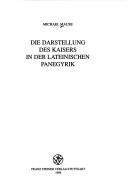
ISBN: 3515066292 9783515066297 Year: 1994 Volume: 50 Publisher: Stuttgart Steiner
Abstract | Keywords | Export | Availability | Bookmark
 Loading...
Loading...Choose an application
- Reference Manager
- EndNote
- RefWorks (Direct export to RefWorks)
Classical Latin literature --- Literary rhetorics --- Laudatory poetry, Latin --- Political poetry, Latin --- Politics and literature --- Emperors in literature --- History and criticism --- Rome --- In literature --- -Political poetry, Latin --- -Politics and literature --- -Literature --- Literature and politics --- Literature --- Latin political poetry --- Latin poetry --- Latin laudatory poetry --- Political aspects --- In literature. --- -History and criticism --- Laudatory poetry, Latin - History and criticism --- Political poetry, Latin - History and criticism --- Politics and literature - Rome --- Rome - In literature
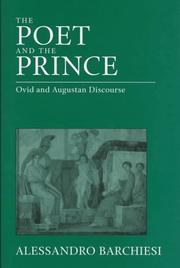
ISBN: 0520202236 9780520202238 Year: 1997 Publisher: Berkeley (CA) : University of California Press,
Abstract | Keywords | Export | Availability | Bookmark
 Loading...
Loading...Choose an application
- Reference Manager
- EndNote
- RefWorks (Direct export to RefWorks)
Rome -- Dans la littérature --- Rome -- In de literatuur --- Rome -- In literature --- Rome dans la littérature --- Rome in de literatuur --- Rome in literature --- Political poetry, Latin --- Politics and literature --- History and criticism. --- Ovid, --- Augustus, --- Political and social views. --- Influence. --- Rome --- History --- In literature. --- Ovid --- Political and social views --- Political poetry [Latin ] --- History and criticism --- Augustus --- Augustus, 30 B.C.-14 A.D. --- Political poetry, Latin - History and criticism. --- Politics and literature - Rome.
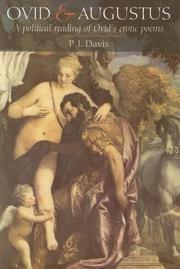
ISBN: 071563559X 9780715635599 Year: 2006 Publisher: London Duckworth Publishers
Abstract | Keywords | Export | Availability | Bookmark
 Loading...
Loading...Choose an application
- Reference Manager
- EndNote
- RefWorks (Direct export to RefWorks)
Erotic poetry, Latin --- Politics and literature --- Poetry --- History and criticism. --- Social aspects --- Ovid, --- Augustus, --- Criticism and interpretation. --- Political and social views. --- Erotic poetry, Latin - History and criticism. --- Politics and literature - Rome. --- Poetry - Social aspects - Rome. --- Ovid, - 43 B.C.-17 or 18 A.D. - Criticism and interpretation. --- Augustus, - Emperor of Rome, - 63 B.C.-14 A.D. - Political and social views. --- Ovid, - 43 B.C.-17 or 18 A.D. --- Augustus, - Emperor of Rome, - 63 B.C.-14 A.D.
| Listing 1 - 10 of 37 | << page >> |
Sort by
|

 Search
Search Feedback
Feedback About UniCat
About UniCat  Help
Help News
News